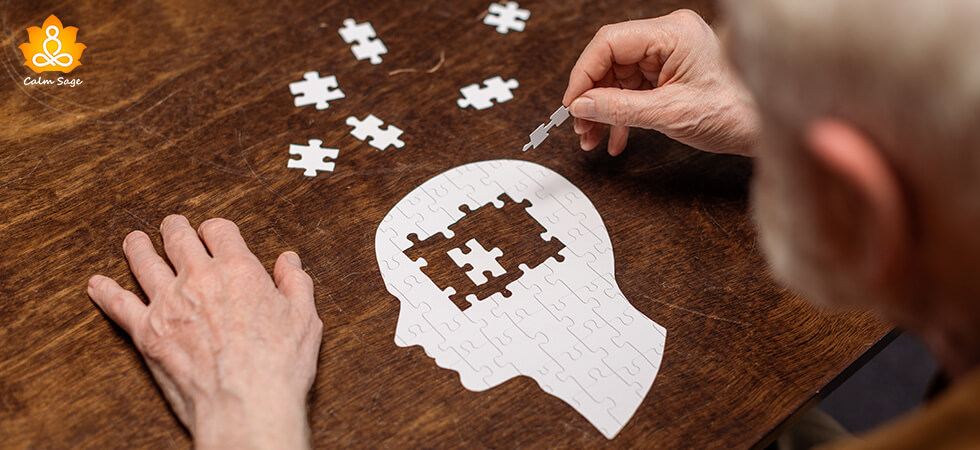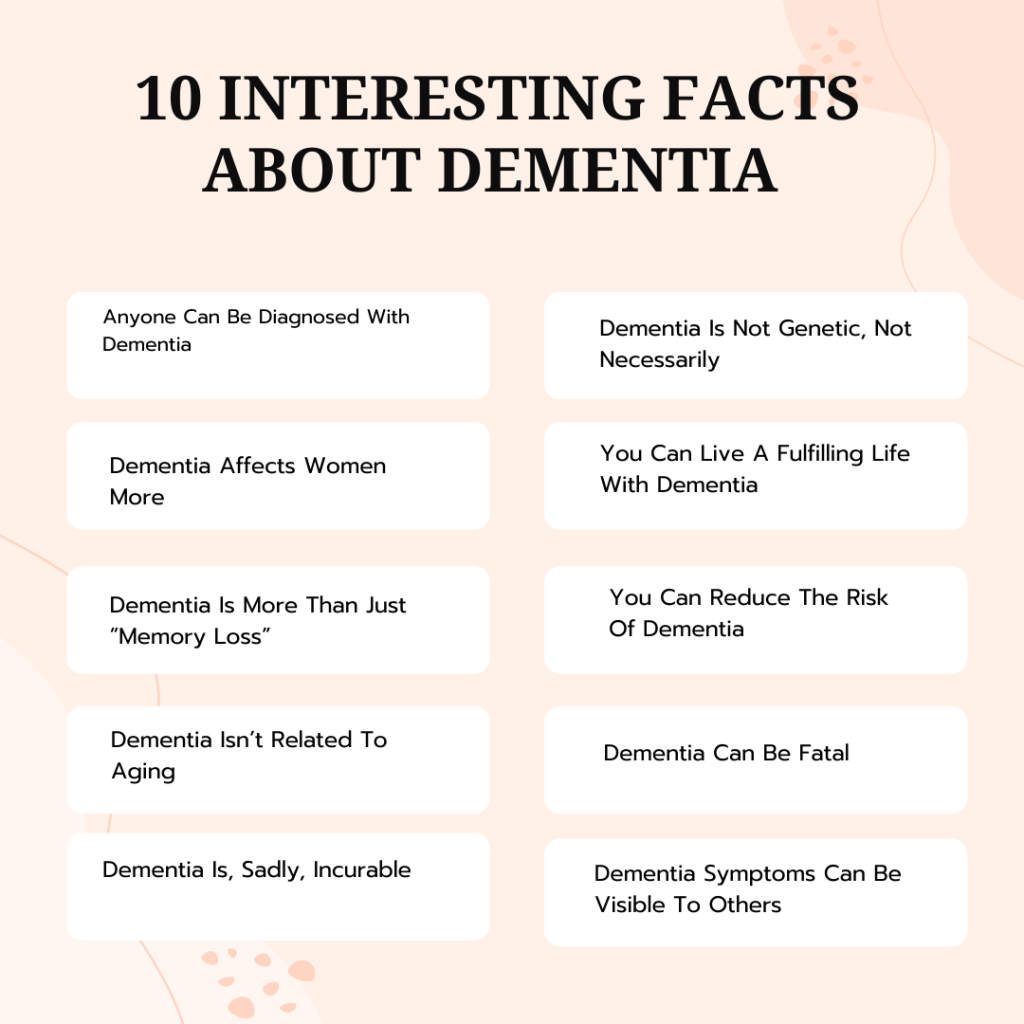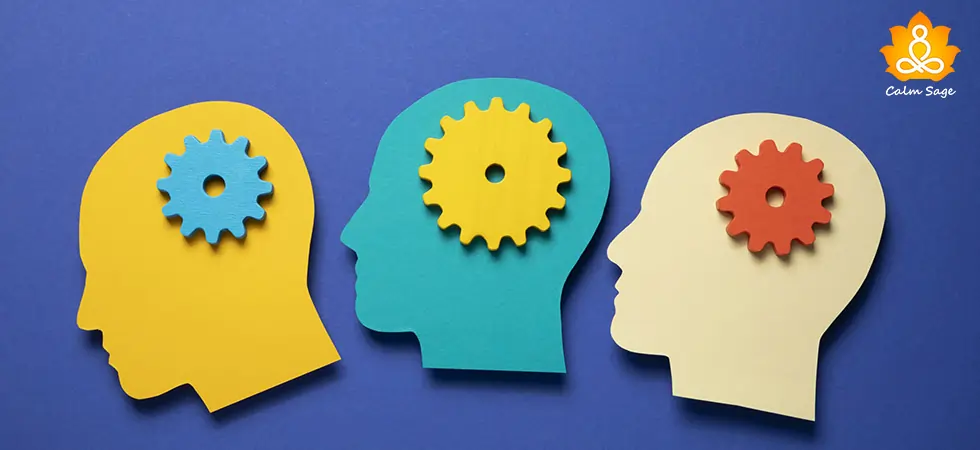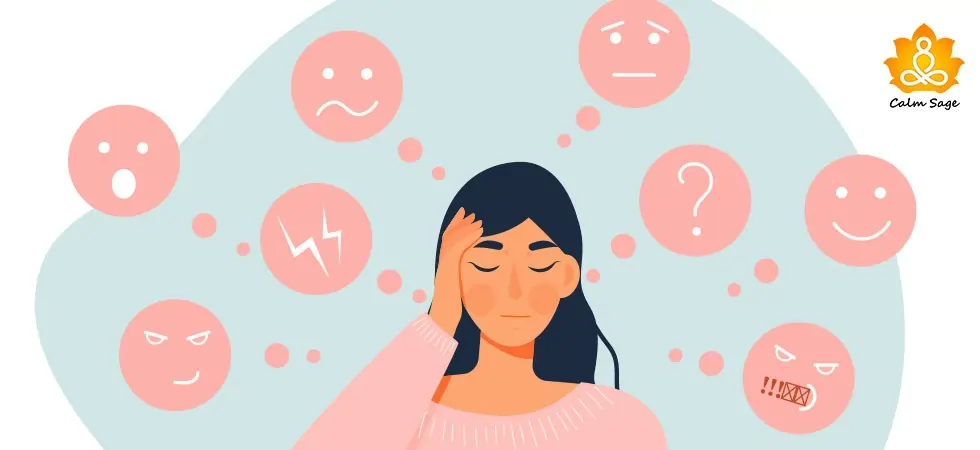10 Interesting Facts About Dementia You Need to Know

Did you know that according to WHO (World Health Organization), there are more than 10 million cases of dementia and other related disorders such as Alzheimer’s recorded every year? At least 3% of adults between the ages of 70-74 and 22% of adults between the ages of 85-89 were diagnosed with dementia in recent times.
Dementia and Alzheimer’s are chronic cognitive conditions that affect and alter memory, thinking, and other social abilities, enough to make it harder for an adult to live a healthy and happy life. With time, dementia can limit one’s ability to function without needing assistance.
Not only does a dementia diagnosis take a heavy mental and emotional toll on the patient but also on their caretakers and loved ones.

Looking at the data with a historical eye, it can be said that the lack of medical and public awareness has led to many myths about dementia rising. Not only do the misconceptions end here but also extend to its causes and the aftercare of the diagnosis.
To help understand what dementia is all about and what it’s not, I’ve collected some interesting facts about dementia for you. These facts about dementia will help you understand what’s true and what’s not. It’s time we stop being ashamed of cognitive disorders and remove the stigma to get our elders the care they need.
10 Interesting Facts About Dementia: From Fiction To Facts
Fact #1: Anyone Can Be Diagnosed With Dementia
Dementia is more commonly diagnosed in older adults, but this does not mean that it’s only diagnosable in the elderly demographics. Anyone can be diagnosed with dementia, it’s not an exclusive-only disorder.
What many people don’t know is that dementia is an outcome of several disorders. If you’ve struggled all your life with issues such as diabetes, hypertension, or a similar condition, then you might be more at risk of being diagnosed with dementia than others – regardless of your age.
Fact #2: Dementia Affects Women More
Dementia affects everyone equally, but women are more prone to the chronic disorder than men. It is said that this is because women have a longer lifespan than men.
Among adults between the age of 70 and older, at least 11% of women and 8% of men were diagnosed with dementia. It’s also said that people with a lower economic background are more likely to be diagnosed with the disorder than those living in a wealthy area or demographic.
Fact #3: Dementia Is More Than Just “Memory Loss”
When I say dementia, the first thing that might come to your mind would’ve been memory loss, and you’re not wrong, but dementia is more than just memory problems. Adults with dementia are likely to experience;
- Changes in their behavior
- Confusion at times
- Delusions and hallucinations
- Trouble concentrating
- Problems with measuring speed and distance
- Problems with movement and balance
Many people believe the myth about dementia that Alzheimer’s and Dementia are different disorders. Dementia is an umbrella term and Alzheimer’s is a symptom (and even type) of dementia.
Fact #4: Dementia Isn’t Related To Aging
As we see more and more cases of dementia being recorded worldwide, one common myth of dementia that arises is that it’s a part of the aging process. Well, it might be true in some rare cases but not in everyone. Older adults are indeed diagnosed with dementia, but it does not mean that the chronic condition is related to aging. There might be other disorders at play that might contribute to the manifestation of dementia.
Fact #5: Dementia Is, Sadly, Incurable
There are stages of dementia before it completely takes over one’s brain and functions. Each dementia stage has its effects on the brain and behavior of the individual. Once it begins its stage, there’s no turning back nor there’s a cure for the disorder.
However, this does not mean that you can’t prevent its spread. When diagnosed in the early stage, you can work and learn skills to manage the symptoms to prolong the progression. Dementia is avoidable. You can avoid dementia and its symptoms by working on your health by way of diet and exercise.
Fact #6: Dementia Is Not Genetic, Not Necessarily
Another interesting fact about dementia is that it is not genetic, despite what many myths may state. If a loved one has dementia, that does not mean that you’ll catch the disorder too. One of the most common types of dementia is Alzheimer’s and there’s no genetic inheritance related here. Of course, your genes might contribute to the disorder but it’s not true that if a relative has been diagnosed with dementia, then you’ll be too.
Fact #7: You Can Live A Fulfilling Life With Dementia
While I agree that getting a dementia diagnosis must be life-changing, it does not mean that one cannot live a fulfilling life even with the diagnosis. You can still live a happy and active life with dementia.
How? Well, the type of care you emphasize matters the most. You can look for a care facility that works on memory care. If you look at a good in-patient facility, then you can find a safe and nurturing environment to work on yourself – cognitive functions and mental faculties too.
Fact #8: You Can Reduce The Risk Of Dementia
While dementia is incurable, there are ways you can reduce the risk of dementia. You can start by working on your memory power, improving your diet, getting regular physical exercise, doing mental exercises, or living an active lifestyle.
You can also try these tips to reduce the risk of dementia and Alzheimer’s;
- Avoid or quit smoking
- Avoid or quit drinking
- Regularly exercising
- Eating a well-balanced diet
Fact #9: Dementia Can Be Fatal
Another interesting fact about dementia is that, in some cases, it can be fatal. Dementia is more than just memory loss. The disorder causes significant damage to the brain and memory loss can just be one of the symptoms.
It’s progressive damage to the brain and because it’s incurable, the majority of people who’re diagnosed with dementia die of it. However, not always. Other physical or mental health issues can also contribute to the progression of dementia and age, but regardless, dementia does reduce the lifespan of an individual.
Fact #10: Dementia Symptoms Can Be Visible To Others
A common myth of dementia is that no one can see the symptoms. Before you go to a professional with your symptoms, ask your loved ones – friends, family members, or even colleagues – if they can see a change in your behavior that is consequent with the symptoms.
If they say that your behavior is changing and not for the good, then maybe it’s time to get professional help. So, when in doubt, ask your loved ones. The symptoms of dementia can be visible to others too.
There’s Still A Lot We Don’t Know…
While we’re trying to stop the stigma related to chronic illnesses and mental disorders, there are times when we can falter. There’s still a lot we need to learn about chronic cognitive conditions like dementia and Alzheimer’s. Dementia and related disorders are illnesses that we might not know much about, but by understanding the onset and signs of dementia, we can begin our self-education.
I hope these little interesting facts about dementia will help you know more about the disorder and will help you care for your loved ones.
If you or your loved one is showing signs of dementia or other related disorders, then you need to immediately seek medical assistance and diagnosis. With a proper diagnosis, you can assure proper care.
For more, you can always write to us at info@calmsage.com or DM us on social media. You can also share your thoughts in the comments section below. We’re here to help you, always!
Take care of yourself and stay safe!
Also Read:
Understanding Dementia | Symptoms, Cause & Treatment
What Is Fear Of Being Forgotten? How To Overcome This Fear?
The Psychology Of Memory: Formation, Duration, Types, And More




















